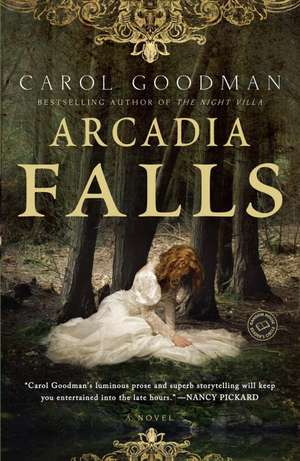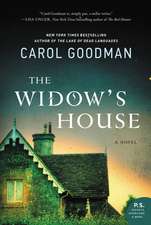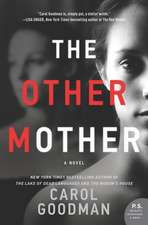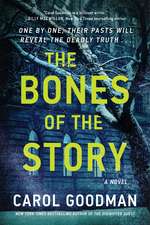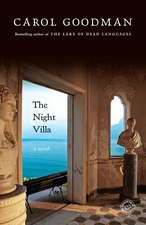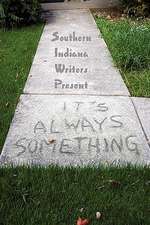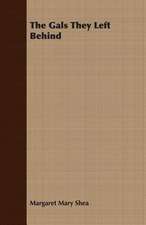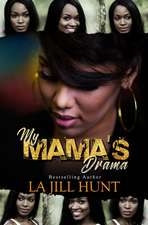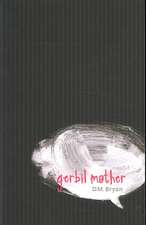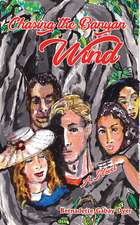Arcadia Falls
Autor Carol Goodmanen Limba Engleză Paperback – 31 ian 2011
Look for special features inside.
Join the Circle for author chats and more.
RandomHouseReadersCircle.com
Preț: 83.52 lei
Nou
Puncte Express: 125
Preț estimativ în valută:
15.98€ • 17.09$ • 13.33£
15.98€ • 17.09$ • 13.33£
Carte indisponibilă temporar
Doresc să fiu notificat când acest titlu va fi disponibil:
Se trimite...
Preluare comenzi: 021 569.72.76
Specificații
ISBN-13: 9780345497543
ISBN-10: 0345497546
Pagini: 368
Dimensiuni: 134 x 201 x 23 mm
Greutate: 0.27 kg
Editura: BALLANTINE BOOKS
ISBN-10: 0345497546
Pagini: 368
Dimensiuni: 134 x 201 x 23 mm
Greutate: 0.27 kg
Editura: BALLANTINE BOOKS
Notă biografică
Carol Goodman is the author of The Lake of Dead Languages, The Seduction of Water, The Drowning Tree, The Ghost Orchid, The Sonnet Lover, and The Night Villa. The Seduction of Water won the Hammett Prize, and others of her novels have been nominated for the Dublin/IMPAC Award and the Mary Higgins Clark Award. Her fiction has been translated into eight languages. She lives in New York State with her family.
From the Hardcover edition.
From the Hardcover edition.
Extras
Chapter One
"We're lost," my daughter tells me for the third time in an hour. "I told you we should have gotten GPS. Lexy's mother has it and they never get lost."
"We're not lost," I reply, biting back the urge to tell Sally that one, we can no longer afford the things Lexy's mother can, and two, the only places Lexy's mother drives to are the Americana shopping center and the hair salon, two destinations within a five-mile radius of their Kings Point home, and so she is not likely to get lost. Instead I say: "We're taking the scenic route."
Sally rolls her eyes, throwing her head, neck, and shoulders into a gesture so practiced it has attained the grace of a yoga asana. I told her this a few weeks ago, making a joke of it. It was the kind of thing she and I used to joke about: eye-rolling teenagers. Instead of laughing, she asked me with exaggerated patience not to try to be funny anymore. And would I please stop comparing everything to yoga, she added as she plugged her iPod buds into her ears.
"Scenic would imply that we were able to see something. How remote is this place?"
"It's only two and a half hours to the city."
"There's a train?" Sally asks, stretching her neck and sniffing as if scenting the air for freedom. When she sits up straight you can see how lovely she is-like an exotic wading bird craning its long neck.
"Well, no, I don't think so. There might be a bus."
"Oh," Sally says, slouching back into her more characteristic slump. She pulls her long legs-in the prefaded jeans that cost more than the rent on my first apartment-up to her chin and plugs in her iPod. "Great. A bus." I may as well have suggested she take a coach and four. Good thing. The last thing I want is Sally running off to the city.
She has a point about the limited visibility of this scenic drive, though. As soon as we got off the highway a low-lying fog had settled on either side of the narrow two-lane country road snaking up into the mountains. I could point out that she used to like fog, that I used to wake her up early on foggy mornings so I could walk her to school. We'd pretend that we were lost in the woods. I'd be Hansel to her Gretel, the Woodsman to her Little Red Riding Hood. She liked the idea of being lost. Her favorite stories were about children lost in the woods and the tricks they used to find their way home-bread crumb trails and yarn unraveled from sweater cuffs. It was a game you could enjoy when you knew what the ending would be: a lighted cottage window shining through the dark, all disfiguring spells broken, and the world restored to what it should be. I couldn't blame her for losing faith in that kind of storybook ending.
It isn't much fun being really lost, which we are now. Although I printed out the directions from the school's website, they'd seemed a little unclear to me. When I called for clarification, Ivy St. Clare, the dean, had laughed. "Oh, we consider it part of the application procedure. Only those who can find Arcadia belong here." Then she had gone on to give a series of impressionistic route suggestions. "By all means take the scenic route that follows Wittekill Creek. Turn right when you see an old decrepit barn-you're a mile from the school when you see that-and then up a steep hill and past the apple orchard where we used to have concerts on summer evenings." Then she had gone into a ten-minute reverie on the days when the Arcadia School was still an arts colony with famous musicians, poets, and painters who all collaborated (a word she used frequently and invested with some magical import). Even Virgil Nash, the famous painter and one of the first teachers at the colony, had played the mandolin. Over the phone, I'd had to listen to a long anecdote about Virgil Nash and some women potters before getting a momentary chance to ask her what I did after we passed the apple orchard (Turn left at the sign of the White Witch). I have the directions on a Post-it note affixed to the dashboard (Poor man's GPS, I quipped to Sally earlier, forgetting her banning of jokes), but they won't do me much good if I can't see the orchard or the sign.
"Do those look like apple trees?" I ask, not really expecting a response from my plugged-in daughter. She gives herself away, though, by glancing out the window at the hobble-branched shapes looming out of the fog on the left side of the road.
"Hey," she says, peeling the buds out of her ears, "those remind me of that story you used to read to me when I was little. Trees like gnomes on crutches marching through the mire."
"They are those trees," I say, trying to keep my voice flat. Enthusiasm, another emotion under interdiction, is a surefire way to scare off any nascent curiosity in Sally. I'm thrilled, though, that she remembers the story. "Remember, I told you that the two women who wrote and illustrated the story, Vera Beecher and Lily Eberhardt, lived here."
"Oh yeah, the lesbians you're writing about."
"We don't know that they were lesbians, honey," I point out, wondering what her current stance on lesbianism is. Last year there was a flurry of nervous e-mails among the mothers of Sally's friends about a new trend in bisexual experimentation, which basically boiled down to Jessica Feingold having made up a story about two girls making out at her Sweet Sixteen. When I asked Sally about it, she dismissed the whole incident as fallout from a recent TV episode, which featured two girls kissing. Then she told me I was no longer allowed to use the words sexuality, gender, or making out.
"Unmarried women often lived together back then. That's how the art colony was started. Some women artists from the city banded together to live up here so that they could work as artists instead of having to get married and spend their time raising families." I pause, wondering if I've just made it sound like having children and pursuing an artistic career are mutually exclusive and how I could explain that back then-in the twenties and thirties-they often were. "These women met at an art school in New York and decided they could pursue careers as artists better if they didn't marry. One of them, Vera Beecher, offered her family estate. Then a bunch of other artists joined them-"
"Like a hippie commune?" Sally asks.
"Sort of, only this was in the late twenties and early thirties, way before hippies. They called themselves bohemians or socialists. It was even before beatniks-"
"I know, Mom, like Audrey Hepburn in those Gap ads."
"Yes, well, anyway they called it Arcadia-after the town, of course, but also because Arcadia was a place in Greece where life was supposed to be perfect."
"And was it?" she asks.
"Was it what?"
"Was life here"-she rolls her eyes-"perfect?"
"Well, nothing's perfect," I begin, but then I realize how often I have given her this speech over the last ten months. She doesn't have to roll her eyes; I'm as bored with the concept as she is. "For a time, yes. They were able to live off money they made doing illustrations for fashion magazines and children's books, which gave them the freedom to do paintings. Vera Beecher was commissioned to do the murals for a college in Pennsylvania and together she and Lily Eberhardt wrote and illustrated fairy tales. That one I used to read you-"
"The Changeling Girl-was that what it was called?"
"Yes," I say, hardly daring to say more, so glad am I that she remembers our old favorite bedtime story. "That was their first fairy tale. They went on to write others and they became so popular that they had enough money to start the school. The proceeds from the fairy tales still fund scholarships for high school students who are talented in writing, visual arts, or music." Like you, I'm tempted to add, but I don't because the last time I told her she was talented she told me that it felt like I was pressuring her. "Do you remember how The Changeling Girl went?"
"Oh, oh, oh . . . There once was a girl who liked to pretend she was lost until . . . until . . ."
"Until the day she really lost her way. She liked to play-"
"In the old orchard and pretend the trees were gnomes on crutches marching through the mire," Sally finishes, her voice ranging through all the forbidden emotions of glee and delight. "Until one day she met an old witch dressed all in white-ohmygod, stop, stop!" Sally shouts, pounding on the dashboard so hard I almost swerve off the road. "There she is! The white witch!"
Out of the fog a pale shape careens drunkenly-a cut-out tin woman with a witch's hat and broom. Rust has covered the painted metal sign, but clearly this is the White Witch, the only remnant of a Prohibition-era speakeasy that was here when the artists first moved up from the city.
"This is the way," I say, turning the car up a narrow private drive. Instantly we are plunged into a twilight so deep I have to stop the car . . . and it stalls, reminding me that Jude's temperamental eleven- year-old Jaguar is past due for its service appointment. But instead of adding and subtracting figures in my head-what I'd get for the car, how much it would cost to replace, how much is left in savings, how much we needed to live on in Great Neck, how little we could live on somewhere else, what could I get for the house, how much would Sally hate me for making her move before her junior year of high school-a process that's become second nature over the last few months, I look up at the arched canopy of trees overhead, their branches intertwining like clasped hands, and listen to the sound of water dripping from their dappled limbs. Then I let out a breath that I feel like I've been holding for the ten months since Jude's secretary called to tell me he'd collapsed during his weekly squash game and been taken to St. Francis Hospital because they had the best cardiac care.
"It's the crystal path that the lost girl takes after she meets the white witch," Sally says, her voice clear as crystal itself. They're the first words untinged by bitterness or regret I've heard her say in months. "See, the trees look like girls in torn dresses because of the way the bark's peeling and they're holding up their freckled arms to make a canopy to protect the lost girl on her journey. And when the sun comes through the trees it catches on the fog droplets and turns them to crystal-oh!" Sally grabs my hand. My heart thuds so hard in my chest that I'm afraid she'll lose a second parent-a thought that, along with the column of figures, keeps me up nights counting my own heartbeats along with the grocery bills and mortgage payments. The life insurance policy is just one of the policies Jude borrowed against in the year before he died. But then I see what she sees. The eastern sky is still a stormy blue, but a sliver of sunlight has appeared at the horizon low in the west. A stream of sunlight brightens the tops of the trees, catching the drops of water among the leaves and making them sparkle like candles in a darkened church.
I look at Sally and see light there, too, a light of wonder that illuminates her face. For the moment, it erases the dark circles under her eyes, the rashy skin around her mouth, the hacked-off ends of her dark auburn hair, and the torn cuticles on her hands. She could be the lovely child I remember from a year ago.
Cautiously, I start the car, praying the engine will turn over smoothly for a change-and it does! Maybe this place is perfect, I think. "Do you remember the rest of the story?"
"Yeah, but you tell it. You always told it so well."
"Okay," I say, scarcely believing my luck. I can't remember the last time I did anything right in Sally's eyes. "After the lost girl meets the white witch she takes the crystal path into the woods and there at the end of it she finds the witch's cottage. The witch takes her in and tells her that if she works for her for a year her family will have everything they need-a warm home, enough to eat, rich suitors for her sisters, beautiful clothes for her mother.
" 'But won't they miss me?' the girl asks.
"But the witch explains that she will send in her stead a fairy changed to look just like her."
"The changeling girl," Sally says.
"Yes. All the girl has to do is go to the old copper beech tree at the edge of the meadow and dig up a root-"
"Is that a copper beech?" Sally asks, pointing up the hill through a gap in the sycamores where a single tree with wine-colored leaves stands on a green lawn before a stone Tudor mansion. I shiver at a detail I always left out when I read the story to Sally-that the beech's leaves were red with the blood of the changelings that lived in its roots. This whole part of the story always struck me as creepy, but I go on, not willing to waste a minute of Sally's attention.
"Yes, it is," I tell her. "The girl digs until she finds a bit of gnarled root shaped like a tiny baby. She takes it out of the ground and wraps it in a piece of calico cloth, which she tears from her own dress-"
"That's why the sycamore trees are like girls with torn dresses," Sally crows. I steal a glance at her. She's sitting up in her seat, the white buds of the iPod tangled in her lap-like naked roots, I think with a little shudder-her eyes shining.
"You know, I never thought of that," I say, "but I think you may be right. Anyway, the witch had told her that she must wash the root in well water, not the water from the stream, but the well is a long way off and the girl knows that the bucket will be hard to haul up. As she's walking toward the well she crosses over the stream-"
As if on cue, the Jag's tires bump over a wooden bridge and Sally thumps the window with her hands in her excitement, the rings on her fingers chattering against the glass like loose teeth. "This is it! This is it!" she cries. "And of course the girl-like all stupid girls in fairy tales-disobeys the witch and washes the root in the stream. And then she goes back to the witch's house and she has to sleep with the root tucked up in bed next to her. Ugh! Remember how that used to scare me? I'd wake up sure that the root was in my bed and that it had come alive in the night, but it would just be one of my stuffed animals, and Dad would have to come in and search through my whole bed."
"He'd take off the sheets and shake out the blankets," I say, stealing another look at Sally to see how she's taking the introduction of her father into the story. The therapist I've taken her to says I ought not to be afraid of sharing anecdotes about Jude, but once again the effect has been to clam her up. She hunches her shoulders, making the bones around her neck stick out. How much weight has she lost since Jude died? When did I last see her eat a real meal? She ordered blueberry pancakes at the diner we stopped at in Rockland County this morning, but she only ate half of one. What kid ever left a pancake unfinished? I wonder if I should say something else about her father here-how he loved her so much that he'd have searched through all the beds in all the world to make sure they were safe for her, that the fact that he up and died on us with debts and second mortgages and borrowed-against life insurance doesn't mean he didn't love us.
But I soldier on with the fairy tale, as the road climbs steadily through a dense pine forest that is as dark and mysterious as the forest where the witch lives.
From the Hardcover edition.
"We're lost," my daughter tells me for the third time in an hour. "I told you we should have gotten GPS. Lexy's mother has it and they never get lost."
"We're not lost," I reply, biting back the urge to tell Sally that one, we can no longer afford the things Lexy's mother can, and two, the only places Lexy's mother drives to are the Americana shopping center and the hair salon, two destinations within a five-mile radius of their Kings Point home, and so she is not likely to get lost. Instead I say: "We're taking the scenic route."
Sally rolls her eyes, throwing her head, neck, and shoulders into a gesture so practiced it has attained the grace of a yoga asana. I told her this a few weeks ago, making a joke of it. It was the kind of thing she and I used to joke about: eye-rolling teenagers. Instead of laughing, she asked me with exaggerated patience not to try to be funny anymore. And would I please stop comparing everything to yoga, she added as she plugged her iPod buds into her ears.
"Scenic would imply that we were able to see something. How remote is this place?"
"It's only two and a half hours to the city."
"There's a train?" Sally asks, stretching her neck and sniffing as if scenting the air for freedom. When she sits up straight you can see how lovely she is-like an exotic wading bird craning its long neck.
"Well, no, I don't think so. There might be a bus."
"Oh," Sally says, slouching back into her more characteristic slump. She pulls her long legs-in the prefaded jeans that cost more than the rent on my first apartment-up to her chin and plugs in her iPod. "Great. A bus." I may as well have suggested she take a coach and four. Good thing. The last thing I want is Sally running off to the city.
She has a point about the limited visibility of this scenic drive, though. As soon as we got off the highway a low-lying fog had settled on either side of the narrow two-lane country road snaking up into the mountains. I could point out that she used to like fog, that I used to wake her up early on foggy mornings so I could walk her to school. We'd pretend that we were lost in the woods. I'd be Hansel to her Gretel, the Woodsman to her Little Red Riding Hood. She liked the idea of being lost. Her favorite stories were about children lost in the woods and the tricks they used to find their way home-bread crumb trails and yarn unraveled from sweater cuffs. It was a game you could enjoy when you knew what the ending would be: a lighted cottage window shining through the dark, all disfiguring spells broken, and the world restored to what it should be. I couldn't blame her for losing faith in that kind of storybook ending.
It isn't much fun being really lost, which we are now. Although I printed out the directions from the school's website, they'd seemed a little unclear to me. When I called for clarification, Ivy St. Clare, the dean, had laughed. "Oh, we consider it part of the application procedure. Only those who can find Arcadia belong here." Then she had gone on to give a series of impressionistic route suggestions. "By all means take the scenic route that follows Wittekill Creek. Turn right when you see an old decrepit barn-you're a mile from the school when you see that-and then up a steep hill and past the apple orchard where we used to have concerts on summer evenings." Then she had gone into a ten-minute reverie on the days when the Arcadia School was still an arts colony with famous musicians, poets, and painters who all collaborated (a word she used frequently and invested with some magical import). Even Virgil Nash, the famous painter and one of the first teachers at the colony, had played the mandolin. Over the phone, I'd had to listen to a long anecdote about Virgil Nash and some women potters before getting a momentary chance to ask her what I did after we passed the apple orchard (Turn left at the sign of the White Witch). I have the directions on a Post-it note affixed to the dashboard (Poor man's GPS, I quipped to Sally earlier, forgetting her banning of jokes), but they won't do me much good if I can't see the orchard or the sign.
"Do those look like apple trees?" I ask, not really expecting a response from my plugged-in daughter. She gives herself away, though, by glancing out the window at the hobble-branched shapes looming out of the fog on the left side of the road.
"Hey," she says, peeling the buds out of her ears, "those remind me of that story you used to read to me when I was little. Trees like gnomes on crutches marching through the mire."
"They are those trees," I say, trying to keep my voice flat. Enthusiasm, another emotion under interdiction, is a surefire way to scare off any nascent curiosity in Sally. I'm thrilled, though, that she remembers the story. "Remember, I told you that the two women who wrote and illustrated the story, Vera Beecher and Lily Eberhardt, lived here."
"Oh yeah, the lesbians you're writing about."
"We don't know that they were lesbians, honey," I point out, wondering what her current stance on lesbianism is. Last year there was a flurry of nervous e-mails among the mothers of Sally's friends about a new trend in bisexual experimentation, which basically boiled down to Jessica Feingold having made up a story about two girls making out at her Sweet Sixteen. When I asked Sally about it, she dismissed the whole incident as fallout from a recent TV episode, which featured two girls kissing. Then she told me I was no longer allowed to use the words sexuality, gender, or making out.
"Unmarried women often lived together back then. That's how the art colony was started. Some women artists from the city banded together to live up here so that they could work as artists instead of having to get married and spend their time raising families." I pause, wondering if I've just made it sound like having children and pursuing an artistic career are mutually exclusive and how I could explain that back then-in the twenties and thirties-they often were. "These women met at an art school in New York and decided they could pursue careers as artists better if they didn't marry. One of them, Vera Beecher, offered her family estate. Then a bunch of other artists joined them-"
"Like a hippie commune?" Sally asks.
"Sort of, only this was in the late twenties and early thirties, way before hippies. They called themselves bohemians or socialists. It was even before beatniks-"
"I know, Mom, like Audrey Hepburn in those Gap ads."
"Yes, well, anyway they called it Arcadia-after the town, of course, but also because Arcadia was a place in Greece where life was supposed to be perfect."
"And was it?" she asks.
"Was it what?"
"Was life here"-she rolls her eyes-"perfect?"
"Well, nothing's perfect," I begin, but then I realize how often I have given her this speech over the last ten months. She doesn't have to roll her eyes; I'm as bored with the concept as she is. "For a time, yes. They were able to live off money they made doing illustrations for fashion magazines and children's books, which gave them the freedom to do paintings. Vera Beecher was commissioned to do the murals for a college in Pennsylvania and together she and Lily Eberhardt wrote and illustrated fairy tales. That one I used to read you-"
"The Changeling Girl-was that what it was called?"
"Yes," I say, hardly daring to say more, so glad am I that she remembers our old favorite bedtime story. "That was their first fairy tale. They went on to write others and they became so popular that they had enough money to start the school. The proceeds from the fairy tales still fund scholarships for high school students who are talented in writing, visual arts, or music." Like you, I'm tempted to add, but I don't because the last time I told her she was talented she told me that it felt like I was pressuring her. "Do you remember how The Changeling Girl went?"
"Oh, oh, oh . . . There once was a girl who liked to pretend she was lost until . . . until . . ."
"Until the day she really lost her way. She liked to play-"
"In the old orchard and pretend the trees were gnomes on crutches marching through the mire," Sally finishes, her voice ranging through all the forbidden emotions of glee and delight. "Until one day she met an old witch dressed all in white-ohmygod, stop, stop!" Sally shouts, pounding on the dashboard so hard I almost swerve off the road. "There she is! The white witch!"
Out of the fog a pale shape careens drunkenly-a cut-out tin woman with a witch's hat and broom. Rust has covered the painted metal sign, but clearly this is the White Witch, the only remnant of a Prohibition-era speakeasy that was here when the artists first moved up from the city.
"This is the way," I say, turning the car up a narrow private drive. Instantly we are plunged into a twilight so deep I have to stop the car . . . and it stalls, reminding me that Jude's temperamental eleven- year-old Jaguar is past due for its service appointment. But instead of adding and subtracting figures in my head-what I'd get for the car, how much it would cost to replace, how much is left in savings, how much we needed to live on in Great Neck, how little we could live on somewhere else, what could I get for the house, how much would Sally hate me for making her move before her junior year of high school-a process that's become second nature over the last few months, I look up at the arched canopy of trees overhead, their branches intertwining like clasped hands, and listen to the sound of water dripping from their dappled limbs. Then I let out a breath that I feel like I've been holding for the ten months since Jude's secretary called to tell me he'd collapsed during his weekly squash game and been taken to St. Francis Hospital because they had the best cardiac care.
"It's the crystal path that the lost girl takes after she meets the white witch," Sally says, her voice clear as crystal itself. They're the first words untinged by bitterness or regret I've heard her say in months. "See, the trees look like girls in torn dresses because of the way the bark's peeling and they're holding up their freckled arms to make a canopy to protect the lost girl on her journey. And when the sun comes through the trees it catches on the fog droplets and turns them to crystal-oh!" Sally grabs my hand. My heart thuds so hard in my chest that I'm afraid she'll lose a second parent-a thought that, along with the column of figures, keeps me up nights counting my own heartbeats along with the grocery bills and mortgage payments. The life insurance policy is just one of the policies Jude borrowed against in the year before he died. But then I see what she sees. The eastern sky is still a stormy blue, but a sliver of sunlight has appeared at the horizon low in the west. A stream of sunlight brightens the tops of the trees, catching the drops of water among the leaves and making them sparkle like candles in a darkened church.
I look at Sally and see light there, too, a light of wonder that illuminates her face. For the moment, it erases the dark circles under her eyes, the rashy skin around her mouth, the hacked-off ends of her dark auburn hair, and the torn cuticles on her hands. She could be the lovely child I remember from a year ago.
Cautiously, I start the car, praying the engine will turn over smoothly for a change-and it does! Maybe this place is perfect, I think. "Do you remember the rest of the story?"
"Yeah, but you tell it. You always told it so well."
"Okay," I say, scarcely believing my luck. I can't remember the last time I did anything right in Sally's eyes. "After the lost girl meets the white witch she takes the crystal path into the woods and there at the end of it she finds the witch's cottage. The witch takes her in and tells her that if she works for her for a year her family will have everything they need-a warm home, enough to eat, rich suitors for her sisters, beautiful clothes for her mother.
" 'But won't they miss me?' the girl asks.
"But the witch explains that she will send in her stead a fairy changed to look just like her."
"The changeling girl," Sally says.
"Yes. All the girl has to do is go to the old copper beech tree at the edge of the meadow and dig up a root-"
"Is that a copper beech?" Sally asks, pointing up the hill through a gap in the sycamores where a single tree with wine-colored leaves stands on a green lawn before a stone Tudor mansion. I shiver at a detail I always left out when I read the story to Sally-that the beech's leaves were red with the blood of the changelings that lived in its roots. This whole part of the story always struck me as creepy, but I go on, not willing to waste a minute of Sally's attention.
"Yes, it is," I tell her. "The girl digs until she finds a bit of gnarled root shaped like a tiny baby. She takes it out of the ground and wraps it in a piece of calico cloth, which she tears from her own dress-"
"That's why the sycamore trees are like girls with torn dresses," Sally crows. I steal a glance at her. She's sitting up in her seat, the white buds of the iPod tangled in her lap-like naked roots, I think with a little shudder-her eyes shining.
"You know, I never thought of that," I say, "but I think you may be right. Anyway, the witch had told her that she must wash the root in well water, not the water from the stream, but the well is a long way off and the girl knows that the bucket will be hard to haul up. As she's walking toward the well she crosses over the stream-"
As if on cue, the Jag's tires bump over a wooden bridge and Sally thumps the window with her hands in her excitement, the rings on her fingers chattering against the glass like loose teeth. "This is it! This is it!" she cries. "And of course the girl-like all stupid girls in fairy tales-disobeys the witch and washes the root in the stream. And then she goes back to the witch's house and she has to sleep with the root tucked up in bed next to her. Ugh! Remember how that used to scare me? I'd wake up sure that the root was in my bed and that it had come alive in the night, but it would just be one of my stuffed animals, and Dad would have to come in and search through my whole bed."
"He'd take off the sheets and shake out the blankets," I say, stealing another look at Sally to see how she's taking the introduction of her father into the story. The therapist I've taken her to says I ought not to be afraid of sharing anecdotes about Jude, but once again the effect has been to clam her up. She hunches her shoulders, making the bones around her neck stick out. How much weight has she lost since Jude died? When did I last see her eat a real meal? She ordered blueberry pancakes at the diner we stopped at in Rockland County this morning, but she only ate half of one. What kid ever left a pancake unfinished? I wonder if I should say something else about her father here-how he loved her so much that he'd have searched through all the beds in all the world to make sure they were safe for her, that the fact that he up and died on us with debts and second mortgages and borrowed-against life insurance doesn't mean he didn't love us.
But I soldier on with the fairy tale, as the road climbs steadily through a dense pine forest that is as dark and mysterious as the forest where the witch lives.
From the Hardcover edition.
Recenzii
“Carol Goodman’s luminous prose and superb storytelling will keep you entertained into the late hours.”—Nancy Pickard
“Addictive . . . [Carol] Goodman delivers an engaging, original story.”—The Boston Globe
“Gracefully written and engaging . . . Goodman specializes in atmospheric literary thrillers, and her newest book . . . is an especially fine specimen of its type.”—The Denver Post
“[Goodman] gives her many fans a new dose of what she does best: good storytelling, with velvet swaths of Gothic mist and fairy-tale eeriness.”—The Plain Dealer
“[A] moving story of mothers and daughters and the hard choices women must make . . . Goodman combines gripping suspense with strong characters and artistic themes. Those who read Anita Shreve or Jodi Picoult are likely to become fans.”—Library Journal
“Addictive . . . [Carol] Goodman delivers an engaging, original story.”—The Boston Globe
“Gracefully written and engaging . . . Goodman specializes in atmospheric literary thrillers, and her newest book . . . is an especially fine specimen of its type.”—The Denver Post
“[Goodman] gives her many fans a new dose of what she does best: good storytelling, with velvet swaths of Gothic mist and fairy-tale eeriness.”—The Plain Dealer
“[A] moving story of mothers and daughters and the hard choices women must make . . . Goodman combines gripping suspense with strong characters and artistic themes. Those who read Anita Shreve or Jodi Picoult are likely to become fans.”—Library Journal
Descriere
From the bestselling author of "The Lake of Dead Languages" comes an enthralling work of literary fiction that follows a mother and daughter as they uncover the sinister secrets of an isolated boarding school.
